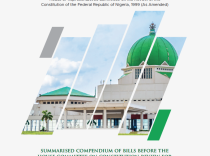The House of Representatives at its plenary session of Wednesday, 22 May 2019 negatived the Police Act (Repeal and Re-enactment) Bill, 2019 (HB. 1636).
Presenting the Bill for the debate on its general principles, Hon. M. T. Monguno (APC:Borno) stated that the Bill was passed by the Senate on 17th April 2019 before its transmittal to the House for concurrence. He also defined the Bill’s objectives as seeking to create a Police Force that was responsible and responsive to the needs of the public as enshrined in its mandate and in line with the values of fairness, justice and equity.
However, during the debate on the Bill, the Chairman, House Committee on Police Affairs, Hon. Lawal Abubakar (APC: Adamawa) stated that some provisions of the Police Reform Bill as passed by the Senate were inconsistent with the Constitution. For instance, he cited the proposed procedure on the appointment of the Inspector General of Police (IGP). The Constitution provides that the IGP shall be appointed by the President on the advice of the Police Council from among serving members of the Police Force. While the Bill maintains this provision, it adds that:
“(1)(b) [The IGP shall] serve for a single tenure of five years notwithstanding the age of retirement.
(3) The person to be appointed as Inspector-General shall be a Senior Police Officer not below the rank of an Assistant Inspector General of Police with the requisite academic qualifications of at least a first degree or its equivalent in addition to professional and management experience.
(4) The appointment of a person for the office of the Inspector-General shall meet the following criteria:
(a) interested persons shall make an open and formal application to the Police Council;
(b) the Nigeria Police Council shall nominate three applicants from among the pool of applicants using the stipulated criteria for competence and qualification; and
(c) the President shall appoint the Inspector-General from the recommended applicants subject to the confirmation of the Senate.”
Furthermore, Hon. Lawal was of the view that reducing the number of Deputy Inspectors Generals (DIGs) from seven to one as stated in the bill was “retrogressive.” The Senate had however made this proposal based on recommendations from former Police Reform Panels.
Hon. Yusuf Lasun (APC: Osun), Deputy Speaker of the House of Representatives also spoke against the Bill stating that Clause 11(2) which requires a Commissioner of Police of a State to be assigned after consultation with the Governor, was contentious for political reasons since the Nigerian Police Force is a Federal establishment. It appears that the Senate’s justification for inserting this provision was to make decision making on such appointments inclusive, to encourage better working relationship between the Police and State governments and possibly address agitations for State Police.
He added that although the intendment of the Bill was good, it had so many issues, which the Committee of the Whole could not work on given its limited time as the 8th winds down Assembly. However, some lawmakers like Hon. Toby Okechukwu (PDP: Enugu) took an entirely different view by proposing State Police as a solution to most of the issues the Bill seeks to cure.
The Speaker then put the question on whether the bill should progress, but majority of the members voted against it. The implication is that it cannot be reintroduced in the current 4th session of the 8th National Assembly according to the rules of the House.





